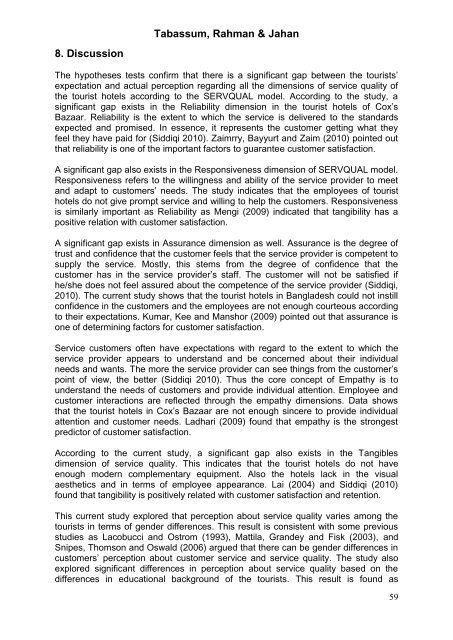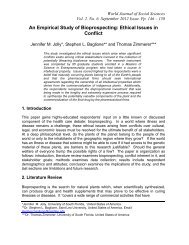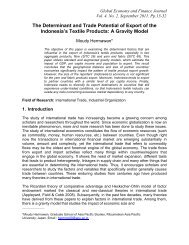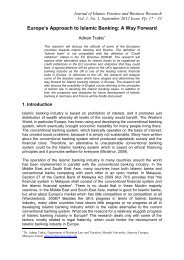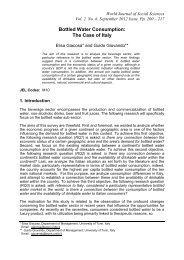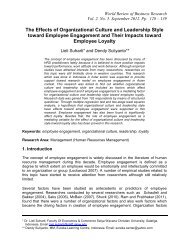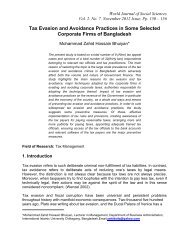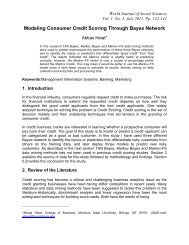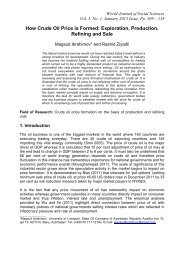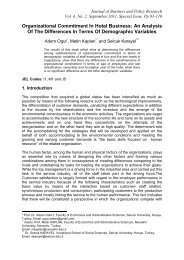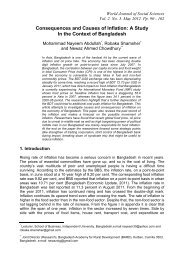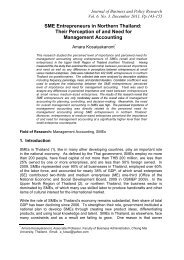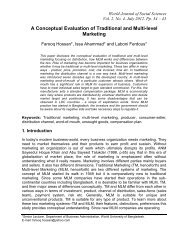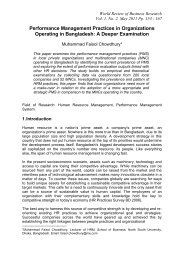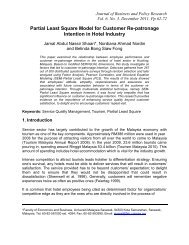Tabassum, Rahman & Jahan8. DiscussionThe hypotheses tests confirm that there is a significant gap between the tourists’expectation and actual perception regard<strong>in</strong>g all the dimensions <strong>of</strong> service quality <strong>of</strong>the tourist hotels accord<strong>in</strong>g to the SERVQUAL model. Accord<strong>in</strong>g to the study, asignificant gap exists <strong>in</strong> the Reliability dimension <strong>in</strong> the tourist hotels <strong>of</strong> Cox’sBazaar. Reliability is the extent to which the service is delivered to the standardsexpected and promised. In essence, it represents the customer gett<strong>in</strong>g what theyfeel they have paid for (Siddiqi 2010). Zaimrry, Bayyurt and Zaim (2010) po<strong>in</strong>ted outthat reliability is one <strong>of</strong> the important factors to guarantee customer satisfaction.A significant gap also exists <strong>in</strong> the Responsiveness dimension <strong>of</strong> SERVQUAL model.Responsiveness refers to the will<strong>in</strong>gness and ability <strong>of</strong> the service provider to meetand adapt to customers’ needs. The study <strong>in</strong>dicates that the employees <strong>of</strong> touristhotels do not give prompt service and will<strong>in</strong>g to help the customers. Responsivenessis similarly important as Reliability as Mengi (2009) <strong>in</strong>dicated that tangibility has apositive relation with customer satisfaction.A significant gap exists <strong>in</strong> Assurance dimension as well. Assurance is the degree <strong>of</strong>trust and confidence that the customer feels that the service provider is competent tosupply the service. Mostly, this stems from the degree <strong>of</strong> confidence that thecustomer has <strong>in</strong> the service provider’s staff. The customer will not be satisfied ifhe/she does not feel assured about the competence <strong>of</strong> the service provider (Siddiqi,2010). The current study shows that the tourist hotels <strong>in</strong> Bangladesh could not <strong>in</strong>stillconfidence <strong>in</strong> the customers and the employees are not enough courteous accord<strong>in</strong>gto their expectations. Kumar, Kee and Manshor (2009) po<strong>in</strong>ted out that assurance isone <strong>of</strong> determ<strong>in</strong><strong>in</strong>g factors for customer satisfaction.<strong>Service</strong> customers <strong>of</strong>ten have expectations with regard to the extent to which theservice provider appears to understand and be concerned about their <strong>in</strong>dividualneeds and wants. The more the service provider can see th<strong>in</strong>gs from the customer’spo<strong>in</strong>t <strong>of</strong> view, the better (Siddiqi 2010). Thus the core concept <strong>of</strong> Empathy is tounderstand the needs <strong>of</strong> customers and provide <strong>in</strong>dividual attention. Employee andcustomer <strong>in</strong>teractions are reflected through the empathy dimensions. Data showsthat the tourist hotels <strong>in</strong> Cox’s Bazaar are not enough s<strong>in</strong>cere to provide <strong>in</strong>dividualattention and customer needs. Ladhari (2009) found that empathy is the strongestpredictor <strong>of</strong> customer satisfaction.Accord<strong>in</strong>g to the current study, a significant gap also exists <strong>in</strong> the Tangiblesdimension <strong>of</strong> service quality. This <strong>in</strong>dicates that the tourist hotels do not haveenough modern complementary equipment. Also the hotels lack <strong>in</strong> the visualaesthetics and <strong>in</strong> terms <strong>of</strong> employee appearance. Lai (2004) and Siddiqi (2010)found that tangibility is positively related with customer satisfaction and retention.This current study explored that perception about service quality varies among thetourists <strong>in</strong> terms <strong>of</strong> gender differences. This result is consistent with some previousstudies as Lacobucci and Ostrom (1993), Mattila, Grandey and Fisk (2003), andSnipes, Thomson and Oswald (2006) argued that there can be gender differences <strong>in</strong>customers’ perception about customer service and service quality. The study alsoexplored significant differences <strong>in</strong> perception about service quality based on thedifferences <strong>in</strong> educational background <strong>of</strong> the tourists. This result is found as59
Tabassum, Rahman & Jahanconsistent with Siu and Mou (2005), and Lee and Chen (2009)’s studies. <strong>Tourist</strong>s’perceptions do not vary based on the differences <strong>in</strong> age, which tally with Samez’s(2011) study and tourists’ perceptions also do not vary based on the differencesoccupation, which is similar with the f<strong>in</strong>d<strong>in</strong>gs <strong>of</strong> Lee and Chen (2009)’s study.9. Managerial ImplicationsThe study confirms significant gap <strong>in</strong> all the dimensions <strong>of</strong> service quality accord<strong>in</strong>gto the SERVQUAL model <strong>in</strong> the tourist hotels <strong>of</strong> Cox’s Bazaar. The study alsosuggests that SERVQUAL model is a suitable <strong>in</strong>strument for measur<strong>in</strong>g the servicequality <strong>in</strong> the tourism <strong>in</strong>dustry <strong>of</strong> Bangladesh. Therefore, the hotel management canuse this <strong>in</strong>strument for measur<strong>in</strong>g service quality <strong>in</strong> Bangladesh. Moreover, becausesignificant service gap exists <strong>in</strong> all the dimensions <strong>of</strong> service quality, Bangladeshitourist hotel managers should emphasize all the service quality dimensions <strong>in</strong>clud<strong>in</strong>gReliability, Responsiveness, Empathy, Assurance, and Tangibility <strong>in</strong> ma<strong>in</strong>ta<strong>in</strong><strong>in</strong>g andimprov<strong>in</strong>g the service quality that they provide. Results regard<strong>in</strong>g the relationship <strong>of</strong>demographic pr<strong>of</strong>ile <strong>of</strong> tourists and service quality also can be a valuable source <strong>of</strong><strong>in</strong>formation for generat<strong>in</strong>g the strategies recogniz<strong>in</strong>g differences <strong>in</strong> consumer groups.10. Limitations and Future Research DirectionsAlthough there are notable contributions from this study especially for customerretention strategies, the results <strong>of</strong> this study need to be viewed and acknowledged <strong>in</strong>lights <strong>of</strong> its limitations. First, the sample size was considerably low. Moreover, thestudy considers only the tourist hotels <strong>of</strong> Cox’s Bazaar. Therefore, future researchshould be conducted on a larger scale by consider<strong>in</strong>g a large sample size fromallover Bangladesh to authenticate the differences between the customerexpectation and perception about tourist hotel services. In future, other variables i.e.customer satisfaction, customer loyalty, customer retention should be <strong>in</strong>cluded andrelated with service quality to validate the importance <strong>of</strong> service quality <strong>in</strong> the hotel<strong>in</strong>dustry <strong>of</strong> Bangladesh.11. ConclusionThe study assessed the service quality <strong>in</strong> terms <strong>of</strong> demographic differences <strong>of</strong> thetourists and also explored the service gap <strong>in</strong> the tourist hotels <strong>of</strong> Cox’s Bazaar byus<strong>in</strong>g SERVQUAL model. The study revealed considerable difference between theservice expectation and service perception <strong>of</strong> the customers <strong>in</strong> the tourist hotels <strong>in</strong>terms <strong>of</strong> reliability, assurance, empathy, tangibility, and responsiveness dimensions<strong>of</strong> service quality. So the hotel management should try to improve these aspects <strong>of</strong>service quality to elim<strong>in</strong>ate the gap that is evident <strong>in</strong> the tourist hotels <strong>of</strong> Cox’sBazaar. Besides, it is also apparent that the tourists’ evaluation about service qualityvaries based on the differences <strong>in</strong> gender and education <strong>of</strong> the tourists. So the hotelsshould formulate their strategies <strong>in</strong> such a way so that each and every group <strong>of</strong>tourists becomes satisfied about the service quality. Many <strong>org</strong>anizations <strong>in</strong> the worldhave focused on the differences among the customer groups and becamesuccessful by meet<strong>in</strong>g the needs and requirements <strong>of</strong> different customer groups. Asthe bus<strong>in</strong>esses are gett<strong>in</strong>g more globalize, these advances are particularly significantbecause a high level <strong>of</strong> service quality is associated with several key <strong>org</strong>anizationaloutcomes, <strong>in</strong>clud<strong>in</strong>g high market share (Buzzell & Gale 1987), improved pr<strong>of</strong>itability60
- Page 1 and 2: World Journal of Social SciencesVol
- Page 3 and 4: Tabassum, Rahman & JahanAkinci 2003
- Page 5 and 6: Tabassum, Rahman & Jahandiagnostic
- Page 7 and 8: Tabassum, Rahman & Jahandifferences
- Page 9 and 10: Tabassum, Rahman & JahanH4 0 : The
- Page 11 and 12: Tabassum, Rahman & Jahanhas been ch
- Page 13 and 14: Tabassum, Rahman & Jahanpoint 0.70
- Page 15: Tabassum, Rahman & Jahan(observed)
- Page 19 and 20: Tabassum, Rahman & JahanGro¨nroos,
- Page 21: Tabassum, Rahman & JahanStevenson,


